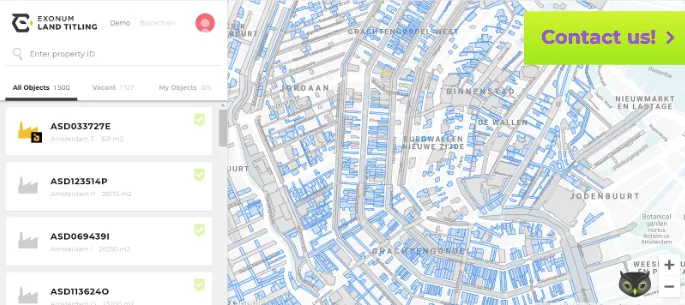The World Bank estimates that fewer than 30 percent of the world’s population has the official title to their land. In Zambia, for instance, getting the deed for your home could change your life. The value of your house increases tenfold, and you become eligible for government welfare services and bank loans.
But the process is expensive, laborious, and occasionally corrupt. There are more than 500,000 land records in the Zambian land administration, but only 176,000 of these records are complete. And, with the government issuing an average of just seven thousand land titles a year for the past decade, it’d take the government dozens of years to get its act straight.
That all changed when the government started experimenting with registering land titles on blockchain in late 2018.
Medici Land Governance, a public benefit corporation who’s partnered with the Zambian government, was able to collect full property records for 56,000 title holders in under three months, smashing the 7,000 a year average. And unlike conventional deeds, new deeds issued via blockchain are tamperproof, meaning they can’t be edited or altered.
A better way
Zambia isn’t alone in experimenting with blockchain technology as a means to record real estate titles and deeds: governments and NGOs all over the world are resolving ownership disputes by uploading land registry titles onto blockchains, making it easier for citizens to keep track of who owns what, and giving them improved control over their assets.
Developed countries are leading the charge. The Georgian government’s land-registry system hopes to make it possible to buy a house in ten seconds, rather than a couple of months, and the British government has created a system to automate land-registry titles and improve the transparency of data.
Success in developed countries could make an even bigger impact in the developing world, where land rights are manipulated, often to make way for construction projects, such as dams or gold mines. “People can be killed,” says Karol Boudreaux, Chief Program Officer at Landesa, a non-profit that works with governments to secure land rights.
Blockchain would make it easier to prove ownership, which could counteract much of the violent displacement that occurs when land titles go missing.
Decrypt spoke to governments, lawyers and NGO leaders, to find out whether blockchain could help secure land rights. And we found that, in conjunction with other emerging technologies, blockchain is already making a huge difference.
Mapping the problem
Traditionally, NGOs helped governments with updated computer software, such as GIS mapping systems. But costly government services in many countries means that land titles are corrupt, and a lack of professionally certified surveyors means that land parcels aren’t demarcated properly.
Without the right land title, “you’re more likely to be forcibly evicted, and less likely to be properly compensated. This lack of property documentation and recognition of rights drives violent conflict all around the world. It’s critically important,” Boudreaux tells Decrypt.
“There are still digital divides, which can be particularly challenging for women,” Boudreaux added. “Women may or may not be listed as spouses of partners on land documents. Even if land documents exist, they are often out of date.”
Bottom up, crowd-sourced solutions, such as the use of community surveyors, means that locals share cell phone GPS locations, and community information about properties, to build a case that someone has a claim to a parcel of land, and share the evidence with governments. If such ownership is validated by the government, someone could apply to a bank for credit, or get access to government resources, like healthcare, or subsidies.
For Boudreaux, blockchain could provide an alternative system of rights outside of the formalized government sector, and reduce the cumbersome process of formally selling or transferring properties on the record.
That’s exactly what happened in The Republic of Georgia, which built the most advanced and successful blockchain system in the world.
The Blockchain Republic
The Republic of Georgia, beset by corruption from its days under Soviet rule, had a lot of catching up to do when the Soviet Union collapsed. Private property was banned under communist rule, so, when it came to privatising land, the government was tasked with compiling millions of documents, scattered across different agencies.
Alongside a series of reforms, which sought to curb corruption and bureaucracy, President Mikheil Saakashvili set up the National Agency of the Public Registry (NAPR) in 2004 to streamline the land registry process. Now, 30 years later, Georgia has one of the most efficient land titling systems in the world—ranked third best by the World Bank.
That’s all helped by blockchain. Their blockchain-based land titling system, developed in collaboration with the Bitfury Group, NAPR, and the Blockchain Trust Accelerator, started in April 2016. A year later, their blockchain system stores more than 2 million extracts about land titles on the public Bitcoin blockchain.
Go ahead, look up your Georgian mansion on their real estate registry. Land titles have the address, name, and mortgage status of property owners, and transactions are recorded, with time stamps, on the public blockchain. Download the land deed and NAPR generates a hash code, a combinations of 64 digits and letters. Enter the hashcode in the blockchain webpage, and you can verify the validity of the document.
While NAPR generate the hashcodes, they’re sent to Bitfury group, who store the hashcodes in their blockchain system. “We have not paid for these two million transactions, it’s all Bitfury’s kind assistance,” Mariam Turashvili, project manager of the NAPR’s blockchain program, says.
Should the Bitfury money well runs dry? “We will find a way,” says Turashvili. “We might even think about creating our private blockchain,” Turashvili adds.
How the program works
First, blockchain means that land titles are decentralized, rather than held on physical, central servers. “It’s been ten years since our last war with Russia, so we need the physical security of the servers, and blockchain protects us from that,” she says. “It’s not only war; it’s also fires. A lot of archives have been burned. Why not keep [data] more secure?”
Second, though Turashvili says the NAPR handled most of Georgia’s corruption, blockchain gives citizens the assurance that their land titles are secure. “A land title is stored on blockchain, and no-one will be able to change it, to delete or alter it, or use the law to manipulate it. Even employees have access to the system, but everything is stored on blockchain, so [citizens] are sure that nothing is going to happen to their ownership right, that it will be protected.”
Privacy concerns? “We don’t save any documents in the blockchain, just the hash code. Even if we did, our legislation says that everything related to property is public.”
In the next phases of the program, Turashvili says that trust contracts will cut the registration fees from a few days to two hours. After legal details are finalized, Turashvili says the NAPR plans to roll out this program in about a month. If the trust contracts are successful, Turashvili and her team will start work on smart contracts. Then, says Turashvili, transferring property titles will “take just minutes”.
How to get to Digital Street
The Bitfury and Republic of Georgia initiative is just one of several collaborations aimed at creating blockchain-based land-titling services.
Bitfury’s John Mercurio says they’re in “discussions around the world with various governments and municipalities,” and recently released a demo showcasing its efforts in Amsterdam.

In the U.K., the government’s land registry is testing out blockchain technology to make it easier to buy and sell homes. Its proof of concept uses smart contracts, which, as Senior Product Manager Lauren Tombs says, “enables the automation of some of the manual aspects undertaken by conveyancers that can sometimes slow down simple transactions.”
It started building up a "Digital Street Community" of people from conveyancers, estate agents, mortgage lenders, PropTech start-ups, homebuyers and sellers across the property market, getting their input on how blockchain could be used to make buying and selling houses less painful. “Using blockchain can lead to faster, more secure transactions, with greater trust and transparency,” said Tombs.
The government's idea came to life when, in March of this year, it showed how smart contracts could have facilitated the sale and transfer of a semi-detached house in Gillingham. When the seller, Stefan, sold his house to the buyer, Peter, without using blockchain technology, the process took 22 weeks.
The team behind Digital Street sat Stefan and Peter down and showed them how, if they had used Digital Street’s blockchain technology, the process of signing contracts would have only taken under ten minutes. Each party in the transaction runs their own "node," giving them “full visibility of the transaction, the business logic and provides the ability to verify that data is valid and check its history,” says Tombs.
“By using blockchain technology, each party was able to see a current view of the transaction, any historical actions that had been taken, and actions that still need to take place before the transaction was complete,” Tombs said. Though the demonstration didn’t actually help Stefan or Peter in any way, the government is using the case study as a success story, proof that future land titles could be done via blockchain.
But Katherine Lang, a senior lawyer at international law firm Taylor Wessing, said that “legally, it’s not actually possible at the moment to transfer property using a smart contract.” You need to transfer property in writing by deed, and an electronic signature doesn’t pass muster. The outcome of an ongoing government report on electronic signatures could result in policy changes, but at least for now, “It’s not legal”.
Nor is using smart contracts necessarily quicker, says Lang, “because you still have to do your due diligence.” Though smart contracts speed up the process of signing deeds--from one day to ten minutes-- Local authority searches, insurance investigations, the surveyor who notices damp in the walls all take time, and “none of that can be replaced by technology.” -- but not the 22 weeks.
Yet Lang still praises the U.K. for its initiative. Britain’s tech scene dominates its European rivals, and adding blockchain to its ancient legal tradition encourages other countries to innovate in their legal sectors.
Developing the world
Developing countries have already taken inspiration, says Medici Land Governance’s CEO, Ali El Husseini, said in an interview. His organization helps governments in Zambia, Rwanda, Liberia, Tulu, Mexico and in poorer parts of the U.S. put land titles on the blockchain.
“People want those titles,” El Husseini says. So much so, that when invited 200 people to hear him speak in Zambia last October, 5,000 showed up, including the country’s Minister for Justice.
El Husseini says they hope to expand the process. By 2020, the goal is for every eligible resident in Zambia’s capital, Lusaka, to have a blockchain-based land title; if it’s successful, the program will be rolled out nationwide.
By providing title deeds, El Husseini says that the government can provide services they previously avoided, claiming the land was home to squatters. “It goes a long way,” says El Husseini.

